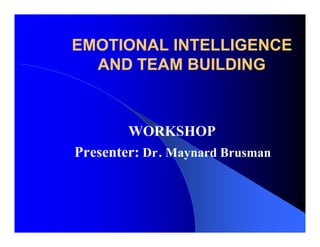
Emotional Intelligence & Team Building
- 1. EMOTIONAL INTELLIGENCE AND TEAM BUILDING WORKSHOP Presenter: Dr. Maynard Brusman
- 2. Learning Objectives l Discuss a workable definition of Emotional Intelligence in leadership and teambuilding. l Understand the five domains of Emotional Intelligence. l Team Building Exercise to explore personal strengths and vulnerabilities related to EQ. l Develop an EQ Action Plan resulting in improved team performance.
- 3. Emotional Intelligence is the ability to… l recognize our own feelings and those of others, motivate ourselves, and manage emotions well in ourselves and in our interpersonal relationships.
- 4. RESEARCH l Up to 90% of the difference between outstanding and average leaders is linked to emotional intelligence. EQ is twice as important as IQ and technical expertise combined, and is four times as important in overall success. l Research by the Center for Creative Leadership found the primary cause of derailment in executives involves deficits in emotional competence. 1. Change 2. Teamwork 3. Interpersonal Relations
- 5. WHY DEVELOP EMOTIONAL INTELIGENCE? l More than 50% of employees lack the motivation to keep learning and improving. l Four in 10 people cannot work cooperatively. l 70% of all change initiatives fail because of people issues – inability to lead, lack of teamwork, unwillingness to take initiative, and inability to deal with change. Hay Group
- 6. EQ vs. IQ EQ key to success in the business world l EQ is the ability to bring people together and motivate them. l EQ is the trust to build productive relationships. l EQ is the resilience to perform under pressure. l EQ is the courage to make decisions. l EQ is the strength to persevere through adversity.
- 7. EQ vs. IQ l EQ is the vision to create the future. l EQ is a skill. Skills can be learned. l Employees in an emotionally intelligent company empowered to contribute fully. l Emotionally intelligent organization creates innovative products & services, and exceptional customer loyalty.
- 8. Five Competencies of Emotional Intelligence at Work l Self-Awareness-Ability to recognize and understand your moods, emotions, and drives, as well as their effect on others. l Self-Regulation-Ability to control impulses and moods. l Motivation-Passion to pursue goals with energy. l Empathy-Awareness of others’ feelings. l Social Skill-Proficiency in managing relationships.
- 9. SECOND THAT EMOTION l Relationships determine who owns the future. l Successful organizations hire based on EQ competencies.
- 10. The Peter Principle and EQ l People are frequently promoted to their level of incompetence. l Individuals are often promoted because of their technical expertise, when the needed skills are managing people. l The technical expert can become a poor boss.
- 11. EQ GREMLINS l Fear l Avoid Conflict and Challenge l Negative Internal Dialogue l Unrealistic Expectations l Blaming Others
- 12. EMOTIONAL AWARENESS l Recognize which emotions you are feeling. l Become aware of the connection between your feelings, thoughts and actions. l Recognize how feelings affect performance. l Guided by values.
- 13. HOW EMOTIONALLY INTELLIGENT ARE YOU? Quiz
- 14. EMPATHY l Starts with self-awareness. l The ability to see things from the other’s point of view. l Y ou can recall some of the same feelings. l Sharing and identifying with emotional states.
- 15. EMPATHY l According to Goleman, empathy represents the foundation skill for all the social competencies important for work. 1. Understanding others 2. Service orientation 3. Developing others 4. Leveraging diversity 5. Political awareness
- 16. EMPATHY QUESTIONS 1. “Can you say more about that?” 2. “Really? That’s interesting. Can you be more specific?” 3. “I wasn’t aware of that. Tell me more.” 4. “I’m curious about that…let’s discuss this in more depth.” 5. “Let me see if I understand you correctly… here is what I heard you say…” 6. “How do you feel about that? What are some of your concerns?”
- 17. SELF- SELF-ASSESSMENT l Aware of strengths and weakness l Reflective, learn from experience l Open to feedback l Seek continuous learning and self- development
- 18. KNOW YOURSELF EXERCISE l What is a current challenge that leads to emotional tensions? l What feelings does that situation trigger? l What thoughts trigger those feelings? l What are some new ways to build relationship in this situation? l What positive outcome can be generated?
- 19. THE 11 COMMANDMENTS FOR AN ENTHUSIASTIC TEAM 1. Help each other be right…not wrong. 2. Look for ways to make new ideas work… not for reason’s they won’t. 3. If in doubt…check it out! Don’t make negative assumptions about each other. 4. Help each other win and take pride in each other’s victories. 5. Speak positively about each other and your organization at every opportunity. 6. Maintain a positive mental attitude no matter what the circumstances.
- 20. THE 11 COMMANDMENTS FOR AN ENTHUSIASTIC TEAM 7. Act with initiative and courage as if it all depends on you. 8. Do everything with enthusiasm… it’s contagious. 9. Whatever you want…give it away. 10. Don’t lose faith…never give up. 11. Have fun! Ian Percy 1991
- 21. ACTION PLAN: l Identify 3 strengths l Identify 3 growth areas l Develop a plan to improve specific skill l Move action forward with a coach
- 22. UNLEASHING OUR POTENTIAL “Our deepest fear is not that we are inadequate. Our deepest fear is that we are powerful beyond measure. It is our light, not our darkness, that frightens us.” Nelson Mandela
- 23. Dr. Maynard Brusman Consulting Psychologist & Executive Coach Working Resources P .O. Box 471525 San Francisco, California 94147 T el: 415-546-1252 E-mail: mbrusman@workingresources.com Web Site: http://www.workingresources.com Subscribe to Working Resources Newsletter: http://www.workingresources.com Visit Maynard's Blog: http://www.workingresourcesblog.com
